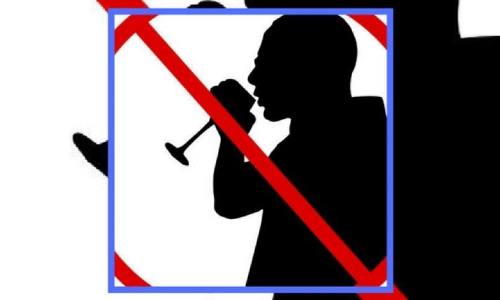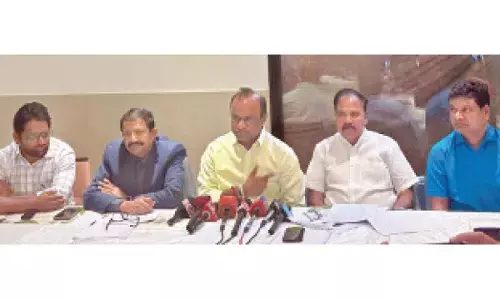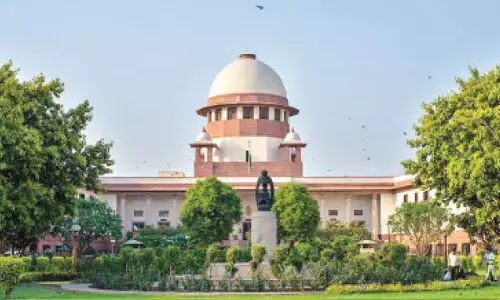Between rock and hard place

Andhra Pradesh is once again witnessing renewed movement for prohibition. However, the fresh round of agitation is not as spontaneous as the anti-arrack stir witnessed in the united Andhra Pradesh.
Andhra Pradesh is once again witnessing renewed movement for prohibition. However, the fresh round of agitation is not as spontaneous as the anti-arrack stir witnessed in the united Andhra Pradesh.
The organised political groups lead the agitation even as ordinary women folk also participate. But, such limitations of the movement do not undermine the significant aspects thrown up for public policy.
The recent women’s agitation is primarily against unabated proliferation of so-called belt shops that provide liquor at the doorstep. We have not yet achieved water for all. But, we have certainly accomplished the goal of liquor for all, indicating the distorted public policy priorities and perversion in governance. Ensuring liquor for all is not part of any Sustainable Development Goals (SDGs).
However, Andhra Pradesh cannot be singled out for this pathetic affair. Often, political parties while in opposition demand total prohibition. But, once they come to power, capitalising on the women’s anger, cite implementation challenges to enforce prohibition.
Instead of at least limiting the pervasive availability of liquor ruining the social life of people, especially the poor, the authorities resort to unabashed encouragement to the sale of liquor as it constitutes a significant part of the revenue mobilisation of the governments.
Instead of attempting to score political points, the ruling and the opposition parties, shunning mutual accusation, should join hands to evolve a coherent and workable public policy to fight this hazard.
Barring its contribution to the government kitty, the liquor boom has no social or economic gains to offer either for the household or the society at large.
The fragile social fabric is rudely shaken, productivity significantly lost, families shattered, women socially and economically oppressed. Crime rates increase, mafia politics thrive, and law and order is adversely affected because of pervading liquor.
It’s true that the government alone cannot arrest this scourge. But, government can certainly minimise its availability and mitigate the suffering. In fact, a much larger view of economic gains of limiting liquor should also be emphasised.
The reduction in liquor consumption will always be associated with improvement in economic and health outcomes and reduced challenge of maintaining law and order. This would significantly alleviate the expenditure burden on the government and compensate for the revenue loss due to reduced liquor sales.
Vavilala Gopalakrishnayya, an eminent freedom fighter who campaigned for prohibition, made a practical suggestion both for the government and the society. Let the government ensure that liquor is not freely available to the people.
The government and civil society should join hands to prevent circulation of spurious liquor. An awakening is required within the society to keep away liquor from their lives.
Such a three-pronged strategy would help in meeting the challenge. The government cannot absolve its responsibility by referring to the practical difficulties in implementing dry law. The opposition and civil society groups cannot confine to mounting demands on government without realising their share of responsibility in driving away the menace of liquor from our lives.
It’s true that banning the sale and consumption of alcohol in several states has left us with unfortunate experience of lopsided implementation.
The opponents of prohibition often suggest the dangers of rotgut if alcohol is not legally permitted. But, controlling rotgut or spurious liquor is an issue of governance. People cannot be asked to pay for the misgovernance. We could not control corruption, should we legalise it? Yet, the debate is not even on total prohibition. Can’t the governments control the free flow of liquor? This would at least mitigate the perils of liquor addiction.
The grave social, economic and health complications of liquor addiction are well-documented. Studies indicate that high alcohol intake increases blood pressure and increases the risk of stroke, liver cirrhosis etc. In the case of under privileged families and communities, liquor spells doom as the resources are diverted to unproductive and disastrous purposes denying the family, especially the children, right to education, health and decent living. High incidence of liquor addiction is also associated with the increasing incidence of domestic violence.
Anecdotal evidence points out to the fact that in the villages having high prevalence of liquor addiction, the number of widows is also abnormally high, indicating higher levels of mortality among men who are more vulnerable to alcoholism. Alcohol is a state subject.
Therefore, each state has its own policy as far as enforcement of prohibition is concerned. It is extremely difficult to create islands of prohibition with porous state borders, what with the myriad ways in which the liquor mafia operate and inept and corrupt administration.
The experiences in several states that have enforced dry law reveals this. Richard Kamei in an article, “Prohibition in Manipur,” published in Economic and Political Weekly, 27 December 2014, documenting the experience of the north-eastern state, writes: “The alcohol business has thrived in Manipur irrespective of its dry state status in the last two decades.
Despite crackdowns by the excise department and vigilantism practiced by civil society groups, alcohol is freely available in the black market. Other than locally brewed alcohol, which is easily available, IMFL can be sourced from several places, including canteens of Assam Rifles and Manipur Rifles. Foreign-made liquor is also smuggled into Manipur from bordering states and from Myanmar via Tamu.”
Sanjeev Kumar and Nishith Kumar in an article, “Bihar’s Alcohol Ban” in Economic and Political weekly, 02 January 2016, argue that a blanket ban on a preferred substance like alcohol gives rise to a black market, underground production activities, price rise and a diversion of scarce law enforcement machinery for activities that the state and the market can easily work together to limit.
But, all this cannot be a justification for allowing unhindered availability of liquor in society despite its proven harmful effects. Public policy cannot be a prisoner of choice between total prohibition or free flow of liquor. There can be more pragmatic alcohol policy that appreciates the implementation challenges and the necessity to enforce the same.
The tenets of such policy can include a host of measures. An increase in the price of alcohol – both through higher taxes and by making it harder to access – might go a long way in curtailing the demand for alcohol. Studies have empirically proved that the demand for sin goods will decline with the increase in taxes or prices of such commodities.
The liquor availability can be minimised by declaring at least one or two days as dry days in a week and they can be progressively increased. Liquor shops should be kept away from highways, schools, hospitals, work places, religious places, residential areas, etc. Availability of liquor in social congregations should be restricted.
The governments should set up more de-addiction centres to wean away the addicts from the menace of alcohol consumption. They should also create more facilities for sports, entertainment and other unharmful recreational facilities to lead a meaningful life which can act as deterrence to alcoholism.
They are also required to regulate the spurious liquor industry and provide alternative gainful employment to those who are hither to engage in production and sale of cheap liquor.
Any restriction on liquor cannot be opposed on the grounds of individual freedom. The Constitution of India does not provide for unbridled freedom and reasonable restrictions are allowed.
Alcoholism is disastrous. Total prohibition is impractical. We are struck between rock and hard place. Wisdom demands pragmatic solutions.










